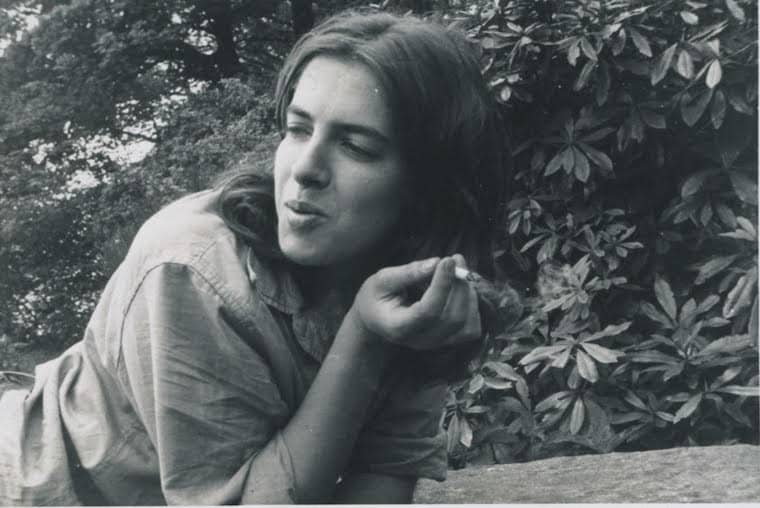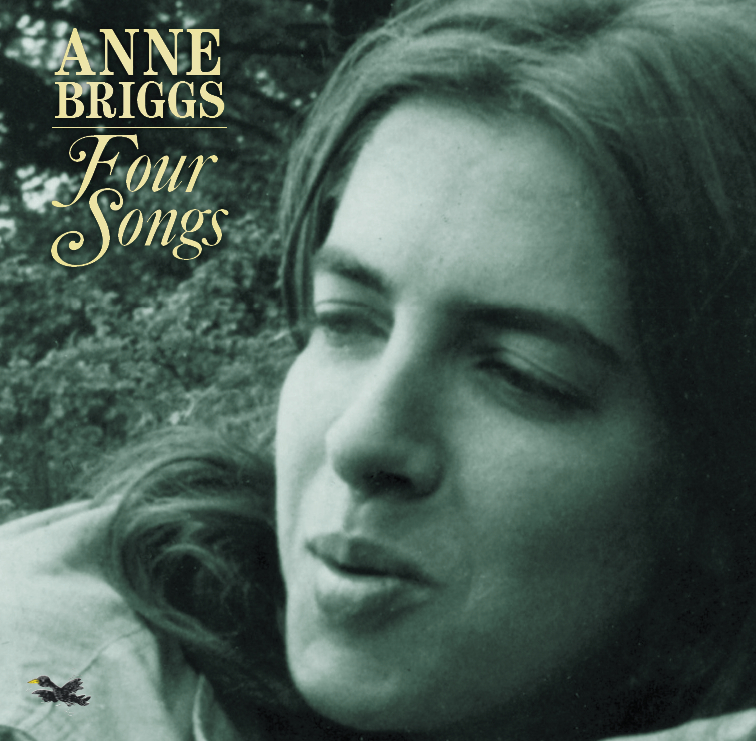Today, Fledgling Records are to release a new Anne Briggs EP titled Four Songs. This is the first time that the four recordings have appeared on record. To mark the release Anne Briggs very kindly agreed to an interview with Folk Radio UK – needless to say, this is something of a rare treat.
Three of the songs (The Recruited Collier, My Bonny Boy , Polly Vaughan) were recorded in 1966 by Peter Kennedy for the BBC’s Folk-Song Cellar, a series that was presented as an informal get together in a fictional folk club (which was actually the basement studio of Cecil Sharp House) and hosted by Scottish duo Robin Hall and Jimmie MacGregor. The final track, The Verdant Braes of Skreen (which you can hear below), was recorded live in 1965 by three close friends of Anne’s: Gren Blatherwick, Spike Woods and Al Atkinson. It was recorded at their local folk club, The Nottingham Co-op Workshop.
Anne was billed as “from Nottinghamshire comes Anne Briggs to sing some of those unaccompanied songs she heard first from the gypsies”. Anyone that has read about Anne Briggs will know that she was well travelled. 1966 was no exception as she revealed when I asked her where she was living at the time.
“In 1966 I was living in three different places, one was various locations in Ireland, another was Gill Cooks flat in London, and thirdly on various floors in and around Nottingham.”
In 2006 Gill Cook passed away, a read through her obituary in The Guardian reveals she was something of an unheralded figure who helped to put world music on the commercial map. She managed Collet’s at 70 New Oxford Street, London where the record store offered music from the likes of the Copper Family to the Nubian oud of Hamza El Din. According to the article, Anne and Bert Jansch wrote some of their songs in her flat.
While 1966 is now fifty years ago Anne recalls the period well. “My strongest memories of this time were of a very lively folk scene, loads of work around, lots of clubs, concerts and festivals all kicking off big time. The folk music of the day was a sort of ‘free for all’, depending on who was organising the events, what their particular motives were, and who was popular at the time. The folk scene in Nottingham was a microcosm of all this, but there had developed an exceptional support for traditional music.
I ask Anne how the folk scene of Nottingham compared to that of Edinburgh and she recalls there being a stronger focus on Scottish traditional songs and singers. She adds that there was also “a strong tendency towards Nationalist new songs” and explains “If a performer didn’t fit into these categories, they had to move south to find an audience, the likes of Bert Jansch and the Incredible String Band did this, but slowly the Scottish scene did open up, and in part I think this was due to the influence of the Irish scene on the status quo of the day.”
Anne is certainly not lacking in a sense of humour when I ask who approached her about appearing on Folk-Song Cellar she says “Probably Jo Lustig who managed many of my bookings during this period” adding “I even made the gig.” Jo Lustig also managed the likes of Ralph McTell, Robin and Barry Dransfield and more. He was well known on the folk scene and according to Wikipedia so was his ‘aggressive publicity-seeking’.
We move onto Anne’s interest in the Travelling community and the songs she learned from them. It all comes flooding back in fascinating detail as she reveals names of people she stayed with who are now folk legends.
“I never intended to be a song collector, as I personally didn’t own the machinery to do it, plus a reluctance on my part to impose myself into many a magical occasion which I instinctively felt would be diminished if not destroyed by the mechanics of machinery. It seemed more important for me to ‘live the moment’ as it was offered, and to absorb and remember what I could.
“I travelled and busked with Irish Travelling people on several occasions over the years. With Mick and Christy Dunne (brothers) in Cork City (we had a pitch outside the Bank of Ireland), Pecker Dunne in Co. Kerry and various towns and villages in the middle of Ireland. Others I sang with and listened to in Dublin, there was a big Travellers camp on the outskirts of the city where there were weekly sessions, and they were really good. There was a stunning singer called John Riley who had a wonderful repertoire of Big ballads, complete versions, and he had an ancient style of singing that had been untouched by the popular and Americanised styles that affected many a good singer.”
“I knew and was often in the company of Ted Furey, another traveller with a good repertoire, and his two sons, Finbar (Irish pipes), and Eddie, who sang, and who had learned to play the guitar, which was really unusual for travellers of that era. There was also another piper called Felix Doran who was occasionally around in Dublin, but I believe he was largely based in England at this time.”
Folk Radio UK recently featured a film by Tommy Fegan called “Coppers and Brass” which looked at the piping tradition of Irish Travellers. Many of the names mentioned by Anne including Felix Doran, brother of Johnny Doran were featured and if those names are unfamiliar to you then I strongly recommend you watch the film here to grasp the importance of these players on the Irish traditional music scene.
Anne continues to pull names from her memory as she turns to one of the best-known singers, Margaret Barry.
“In the early sixties, I had been in the company of Margaret Barry on several occasions, another Traveller who was then based in London, living with Michael Gorman, the fiddler. Margaret had a mighty voice and the personality to go with it, and when in top form could make the hairs stand up on the back of your neck.”
Whilst Anne had spent considerable time in Ireland she also spent time with the most famous of Scottish traveller families, the Stewarts.
“In ’62 and’63 I had met and worked with several Scottish travellers who were singers or musicians, the Stewart family from Blairgowrie, also Jeannie Robertson, Sheila Stewart and Lizzie Higgins. The women were all singers of exceptional quality, and the menfolk were musicians.
“In the late ’60’s I met up with the Smith family, and the mother was called Phoebe, and she was a splendid singer too. They were English Travellers, and by that I mean they spoke English with an East Anglian dialect and had probably been based in the area for several generations, but they had ties and contacts with the Irish and Scottish Travellers. I didn’t see as much of these folks as I would have liked as I shortly left the area just as I was getting to know them.”
Centre 42 was a group of artists, writers, actors and musicians who took their name from Resolution 42 passed at the 1960 TUC Congress, essentially a way of making arts and culture accessible to the masses rather than the elite. As Anne explains, Centre 42 also provided something of a personal creative journey for her.
“Centre 42 exposed me to singers I hadn’t heard before, either because they hadn’t recorded, or because I didn’t have access to their material.
“I was aware of some of the work being done by Ewan.McColl, Peggy Seeger and Bert Lloyd, mostly via radio programmes, and particularly the Radio Ballads, and I had previously met Ray Fisher on an earlier visit to Scotland. New faces and voices for me were Bob Davenport, Louis Killen and Johnny Handle, all originally from the N.E., Cyril Tawney from the South of England, the McPeake family from Northern Ireland, the Stewart family from Scotland, etc. Exposure to this wide variety of folk music, rich in regional and cultural differences put me on a steep learning curve, as it helped me to learn how to listen, which probably had a huge influence on my own style of singing, though I was totally unconscious of it at the time, I was unaware of having any style at all! I just wanted to sing in a way so people could hear the song and get the meaning. When I was singing I always wanted to ‘disappear’, so the audience could hear the song better and not have to look at me. I almost felt I’d achieved this on some occasions.”
To my ears, the musical scene of the fifties and sixties were one of the most dramatic with audiences being exposed to more music than ever before. A glance through recent books by the likes of JP Bean’s Singing from the Floor and Rob Young’s Electric Eden make you realise how dramatic that change was. The folk clubs and Centre 42 played a major role in this as Anne explains.
“The folk clubs were good in that they provided a platform for all sorts of music, and other related entertainments and they were relatively affordable for young audiences, and they were cosmopolitan. One could hear blues, jazz, country, traditional, European, American,folk , rock and pop. Also dancers, cloggers, rappers, raconteurs, puppeteers. It was a musical circus time.
“I think Centre 42’s musical contribution to all this was to show ‘The Sticks’ what a wealth of folk musicians were available, and it made audiences aware in places like Nottingham, Bristol, Birmingham, Manchester etc. that there were a lot of people with similar interests in their area, and enough of them to be able to support new folk clubs, put on concerts, set up tours etc. It seemed that in no time at all every small town had at least one folk club, and in the cities, there were several. Most folk clubs were musically inclusive, as were most audiences. There were the odd exceptions, often politically driven, but usually they didn’t survive very long. Anyway, musical fusion was inevitable with all these different things happening on the same night on the same platform. The resulting sounds were on occasion quite magical, and some groupings still survive to this day. Sometimes the results were ‘questionable’, but, hey, everyone was having a good time singing, playing, dancing, or just listening and dreaming.”
I throw the question of whether those changes represented progress. Anne is quick to respond and even offers me her own inspiring definition.
“Well there certainly was a musical progression, and it’s still happening. I think most people are musically much better informed than they were 50 years ago, and I’ve been impressed by the depth of learning many young people possess now. I think I need a definition of progress, as to me it implies a destination. I think I prefer to travel in hope rather than to arrive.”
As we draw the interview to a close I ask Anne whether she’s aware of the influence she’s had on many artists today, her answer is humble yet crossed with a lovely sense of humour which makes it the perfect end to the interview.
“I wasn’t aware of this until fairly recently. It was something of a shock, really. Hope nobody who is under this influence comes to musical grief. But I am very much moved.”
Tracklisting
The Recruited Collier / My Bonny Boy (A Bower In My Breast)
b/w Polly Vaughan / The Verdant Braes Of Skreen
WING 1006 : 7” vinyl EP
5020393 100649
Release date : 12th August 2016
Order Four Songs here: fledglingrecords.co.uk/product/anne-briggs-four-songs-wing-1006-vinyl-ep


